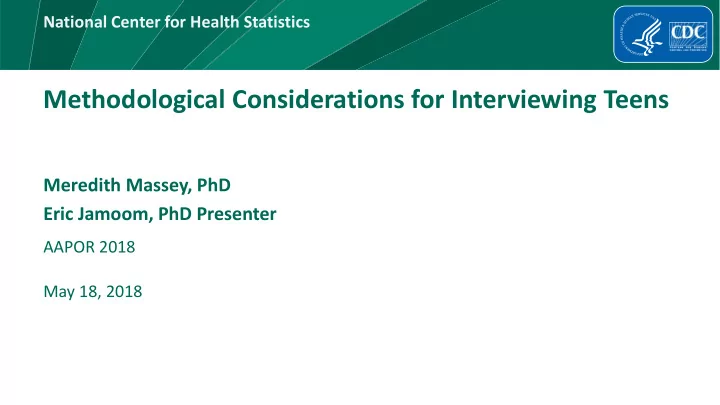

National Center for Health Statistics Methodological Considerations for Interviewing Teens Meredith Massey, PhD Eric Jamoom, PhD Presenter AAPOR 2018 May 18, 2018
Outline Background Recruitment Scheduling and logistics Consent Confidentiality Interview protocol
Background
Recent NCHS Studies with teens Disability – For the Washington Group/UNICEF – to determine whether to ask questions on teen disability to teens or to their parents Alcohol and Marijuana use – For the Youth Risk Behavior Survey – To refine questions
Difficulties interviewing teens More expensive Hard to recruit Can be difficult to get teens to talk
Reasons to interview teens Content area relevant to teens Survey instrument intended for teens To compare teens and adults
Recruitment
Recruitment Recruiting teens is difficult! Gate keepers Must screen both parent and teen Incentives work
Recruitment Alternative recruiting strategies are key – Topic focused organizations – Schools – Libraries and youth centers – Word of mouth – Peer networks
Scheduling and Logistics
Scheduling Scheduling is difficult! Must work with teens schedule Must coordinate with interviewers Must coordinate with parents Evening and weekend hours often best Higher rates of no-shows and reschedules
Logistics Secure building ID required Must be US citizen
Consent
Consent Minors are a protected class By law, minors can’t consent Must get parental consent
Consent If respondent is under 18 – Require signed parental consent • Mailed in advance • In sealed envelope + phone call – Teen assent If 18 or over – Signed consent – No parental consent needed
Confidentiality
Confidentiality Teens are not video recorded Audio is requested No “special consent” “Restricted Status” for storage purposes
Interviewing Protocol
Teen not saying much: Teen disability Interviewer: So you said you have some difficulty seeing. Why did you say “some difficulty?” Teen: Sometimes I’m too far to see things far away. Interviewer: What type of thing? Teen: Like a stop sign. Interviewer: With your glasses on? You have a hard time seeing far away? Teen: Yeah. Interviewer: Is that all the time? Teen: Yeah. Interviewer: What about up close? Teen: No problem.
Teen more forthcoming: Teen alcohol and marijuana Interviewer: You said 70 days. Is that your estimate. Teen: Yeah. I guess. It’s hard to put a number on it. Over someone’s life it would be hard to put it into days. I would say months. Or maybe how many days do you drink in a year. But since you asked for a number, I’ll say 70. Interviewer: So you said you were 14 when you first started drinking. Teen: I was thirteen. It wasn’t heavily. It was the first time. Interviewer: Oh ok. Can you tell me about that. Was it at a party? Teen: I was in Europe with my parents. And it was Spain so I could drink wine and brandy. It wasn’t social. After that my parents were less strict about alcohol. I can have a glass of wine or whatever. We’re not religious so we’ve never done any religious drinking. They don’t mind when I drink with my friends as long as it’s mellow. Interviewer: So when did you start drinking with your friends? Freshman year of high school. I think I was 15. yeah. It might have been 8 th grade. I don’t remember exactly when. It was probably the end of 8 th grade. I probably drink once or twice a weekend. It’s usually the same group of friends. We’ll have a party or go to a friends house. When it’s nice we go outside, but now it’s winter so we go inside. Where ever is available. Where ever we can find a space. We hang out and do stuff while we drink. There’s beer pong. We’ll play music and talk or if there’s other games like a pool table we’ll do that but mostly social stuff. It’s always social and hanging out . Not like we’re just getting wasted or sitting in our rooms drinking by ourselves.
Interviewing recommendations Establish rapport Explain purpose Begin by asking general information Make connections Seem interested Leave space
https://www.cdc.gov/nchs/CCQDER/ Reports available on Qbank: https://www.cdc.gov/qbank For more information please contact Centers for Disease Control and Prevention 1600 Clifton Road NE, Atlanta, GA 30333 Telephone: 1-800-CDC-INFO (232-4636)/TTY: 1-888-232-6348 Visit: www.cdc.gov | Contact CDC at: 1-800-CDC-INFO or www.cdc.gov/info The findings and conclusions in this report are those of the authors and do not necessarily represent the official position of the Centers for Disease Control and Prevention. National Center for Health Statistics Place Descriptor Here
Recommend
More recommend